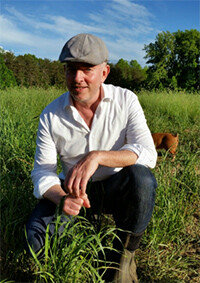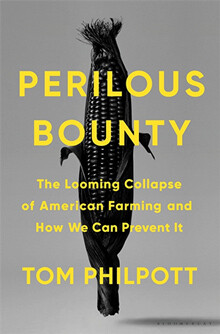Tom Philpott Speaks on the Impending Collapse of American Agriculture
The Law, Ethics & Animals Program (LEAP) at Yale Law School hosted investigative journalist Tom Philpott for a discussion of his new book, Perilous Bounty: The Looming Collapse of American Farming and How We Can Prevent It. His October 28, 2020 book talk was cosponsored by the Environmental Protection Clinic at Yale Law School, the Yale Sustainable Food Program, the Yale Animal Law Society, the Yale Environmental Law Association, the Yale Institute for Biospheric Studies, and the Poynter Fellowship in Journalism. The talk was moderated by LEAP Student Fellow Lexi Smith ’22.
WATCH: Tom Philpott on the future of American farming

For over a century, mild winters and hot, dry summers — along with a steady, easily-channeled water source derived from the Sierra Nevada mountains — have generated what Philpott called a “dream scenario” for California’s Central Valley, making it one of the world’s most prodigious producers of fruits and vegetables as well as nuts and milk. This dream, unfortunately, is coming to an end. Scientists have only recently discovered that the 20th century was an anomalously wet century in California, and the state’s precipitation levels are reverting back to average levels. Additionally, climate change is starting to produce even less precipitation and hotter summers, forcing California’s farmers to obtain most of their water via the water table and generating what Philpott described as a “race to the bottom of the aquifer.”
“What you get coming into the 21st century,” Philpott said, “is an agriculture so big and so profitable and so ravenous for water that it’s over-stripped the resource of the Sierra Nevada.” If current climate trends continue, moreover, the Sierra Nevada snowpack may run dry by the end of the century, further stressing the Central Valley’s groundwater. With America so reliant on California’s fruits, vegetables, and nuts, Philpott argued that the looming collapse of the state’s water supply — as well as the growing risk of apocalyptic floods — should force the country to have a “reckoning” over the fragility of its food system.

At the very least, however, the Central Valley produces foods that are generally healthy for people to eat. In the Corn Belt, where soy and corn monocrops have come dominate the landscape, the opposite is true. “The foods derived from these products are killing us and causing all kinds of public health crises,” Philpott said. But corn and soy monocrops aren’t just bad for consumers at the end of the food chain. The “incredible hegemony of corn and soybean agriculture,” Philpott argued, has also resulted in a massive soil erosion crisis that threatens the Corn Belt’s notoriously rich, dark soil. While the USDA’s official data reports soil erosion numbers that are only slightly higher than the replacement rate, Philpott, drawing on the work of Iowa State University agronomist Rick Cruse, found that those numbers do not take into account ephemeral gullies, or large channels formed by water runoff during heavy rains. These rains can be especially strong in the late winter and spring, when most corn and soy fields lie empty. Taking that into account, Philpott estimated that Iowa, along with much of the surrounding Corn Belt, is losing its infamous topsoil at around 16 times the natural replenishment rate. The combined ecological and public health harms produced by Corn Belt agriculture, Philpott concluded, amount to a “pretty terrible bargain” for most Americans.
All these problems raise the obvious question: who exactly benefits from this system? Philpott argued that the biggest beneficiaries are the massive corporations which straddle both ends of the food system, providing inputs to American farmers and buying their products. From seed and pesticide providers like Bayer, to grain trading firms like Archer Daniels Midland and Cargill, to meat companies like JBS and Tyson, highly concentrated markets for suppliers and buyers are able to reap massive profits from our current farming system. These companies, Philpott argued, “capture the value that emerges from the Midwest and its incredible store of topsoil. And what they do for it in exchange for capturing all that value is give us a really catastrophically bad diet.” They’ve also used those profits to curry an immense amount of political influence through lobbying and campaign donations, influencing crucial pieces of legislation like the Farm Bill and preventing meaningful attempts at reform.
Given the profound problems that exist in America’s current food system, Philpott eschewed politically quietist “vote with your fork” solutions. “Whether it’s getting people out in the streets, whether it’s electing progressive candidates to Congress and the White House, the only way to change things is through politics,” Philpott said. “We have to do politics.”
Tom Philpott is a former farmer and the food and agriculture correspondent for Mother Jones. His work has been featured in The New York Times, Grist, Newsweek, The Guardian, and many other publications. He has won a Gerald Loeb Award for Distinguished Business and Financial Journalism, and his column was named “Best Food Blog” by the Association of Food Journalists in 2014. He is also a cofounder of Maverick Farms, a center for sustainable food education in North Carolina. Most recently, he is the author of Perilous Bounty: The Looming Collapse of American Farming and How We Can Prevent It.
To receive announcements about upcoming Law, Ethics & Animals Program speaker series events, sign up for LEAP’s email newsletter.
By Jack McCordick


